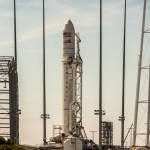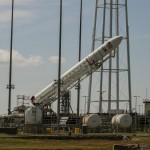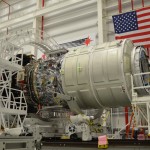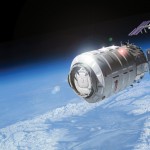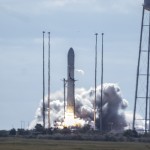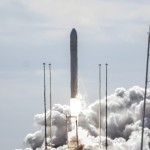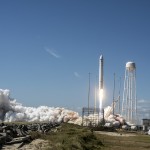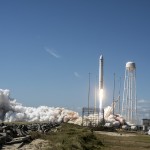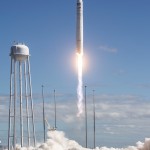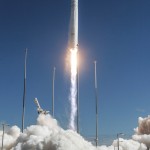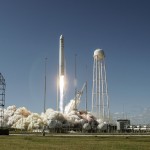Marking a giant stride forward in NASA’s plans to rely on the private sector for cargo, and eventually human, deliveries to ISS, Orbital Sciences Corporation’s Antares rocket blasted into space today carrying the company’s Cygnus cargo logistics spacecraft. The successful launch marked the beginning of a four-day in-orbit capabilities demonstration mission that will culminate in rendezvous and berthing with ISS. Cygnus will deliver approximately 1,500 lbs. of cargo and remain attached to the ISS for 30 days before departing with up to 1,750 lbs. of disposal cargo.
“Today marks a milestone in our new era of exploration as we expand the capability for making cargo launches to the International Space Station from American shores,” said NASA Administrator Charles Bolden. “Orbital’s extraordinary efforts are helping us fulfill the promise of American innovation to maintain our nation’s leadership in space.”
Lift-off of Orbital’s Antares rocket occurred at approximately 10:58 a.m. EDT from the Mid-Atlantic Regional Spaceport (MARS) located at NASA’s Wallops Flight Facility in eastern Virginia. Following a 10-minute ascent, the Cygnus spacecraft was successfully deployed by the Antares upper stage and placed into its intended orbit of about 180 x 160 miles above the Earth, inclined at 51.6 degrees to the equator. Approximately 20 minutes later, Orbital’s Cygnus engineers confirmed that reliable communications had been established and that the solar arrays were fully deployed, providing the necessary electrical power to command the spacecraft.
“This launch prepares the way for Orbital to begin supplying the ISS on regularly scheduled flights and we congratulate our customer on another success,” said Scott Lehr, vice president and general manager of ATK’s Defense and Commercial division. ATK developed the Castor 30 solid propellant motor that powered the upper stage of Antares. “We are excited to be a part of Orbital’s Antares team as they undertake future missions for the NASA CRS program.”
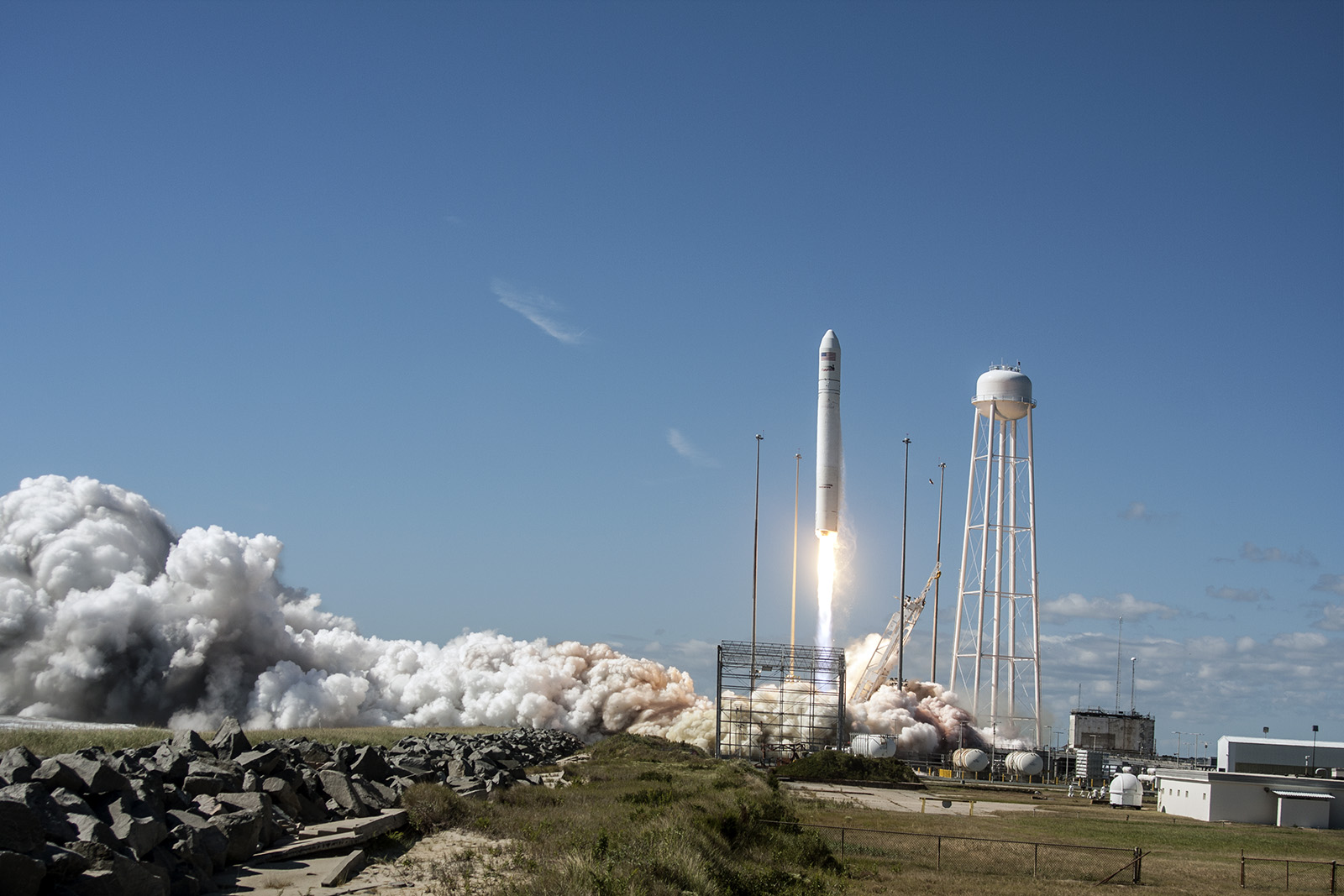
Over the next several days, Cygnus will perform a series of maneuvers to test and prove its systems, ensuring it can safely enter the so-called “keep-out sphere” of the space station, a 656-foot (200-meter) radius surrounding the complex.
The inaugural mission of Orbital’s Cygnus cargo-carrying spacecraft will mark the completion of one of NASA’s most successful commercialization efforts in recent history. The Commercial Orbital Transportation System (COTS) program was created to spur the development of private sector space station resupply capabilities via development of new spacecraft and launch vehicles.
About Antares
The Antares medium-class launch vehicle provides a major increase in the payload launch capability that Orbital can provide to NASA, the U.S. Air Force and commercial customers compared to their Pegaus, Taurus and Minotaur vehicles. The Antares rocket will launch spacecraft weighing up to 14,000 lbs. into low-Earth orbit, as well as lighter-weight payloads into higher-energy orbits. Orbital’s newest launcher is currently on-ramped to both the NASA Launch Services-2 and the U.S. Air Force’s Orbital/Suborbital Program-3 contracts, enabling the two largest U.S. government space launch customers to order Antares for “right-size and right-price” launch services for medium-class spacecraft.
About Cygnus
Under COTS, NASA and Orbital developed Cygnus, which meets the stringent human-rated safety requirements for ISS operations. Orbital privately developed the Antares launch vehicle to provide low-cost, reliable access to space for medium-class payloads. Together, these elements are being used for the demonstration flight of Orbital’s commercial resupply capability to the ISS.
Future Cygnus flights will significantly increase NASA’s ability to deliver new science investigations to the only laboratory in microgravity. As one of two U.S. carriers capable of providing cargo resupply missions to the space station, a successful demonstration mission will ensure a robust national capability to deliver critical science payloads to orbit. NASA’s other cargo resupply provider, Space Exploration Technologies (SpaceX), began flying regular cargo missions to the space station in 2012, following its own COTS demonstration mission.
“Today’s launch is the culmination of more than five years’ work between the NASA and Orbital teams,” said Alan Lindenmoyer, NASA’s program manager for commercial crew and cargo. “Everyone involved should be extremely proud, and we are looking forward to a successful series of checkouts between now and when Cygnus reaches the space station this weekend.”
Beginning later this year, Orbital will conduct eight operational Cygnus missions to deliver approximately 20,000 kilograms of cargo to the ISS, including crew supplies and consumables, spare parts and equipment, and scientific experiments. Cygnus consists of a common Service Module (SM) and a Pressurized Cargo Module (PCM). The SM incorporates avionics, power and propulsion systems already successfully flown aboard dozens of Orbital’s LEOStar and GEOStar satellite products. The PCM, designed and built by Thales Alenia Space under a subcontract from Orbital, is based on the Multi-Purpose Logistics Module (MPLM) used with the Space Shuttle.
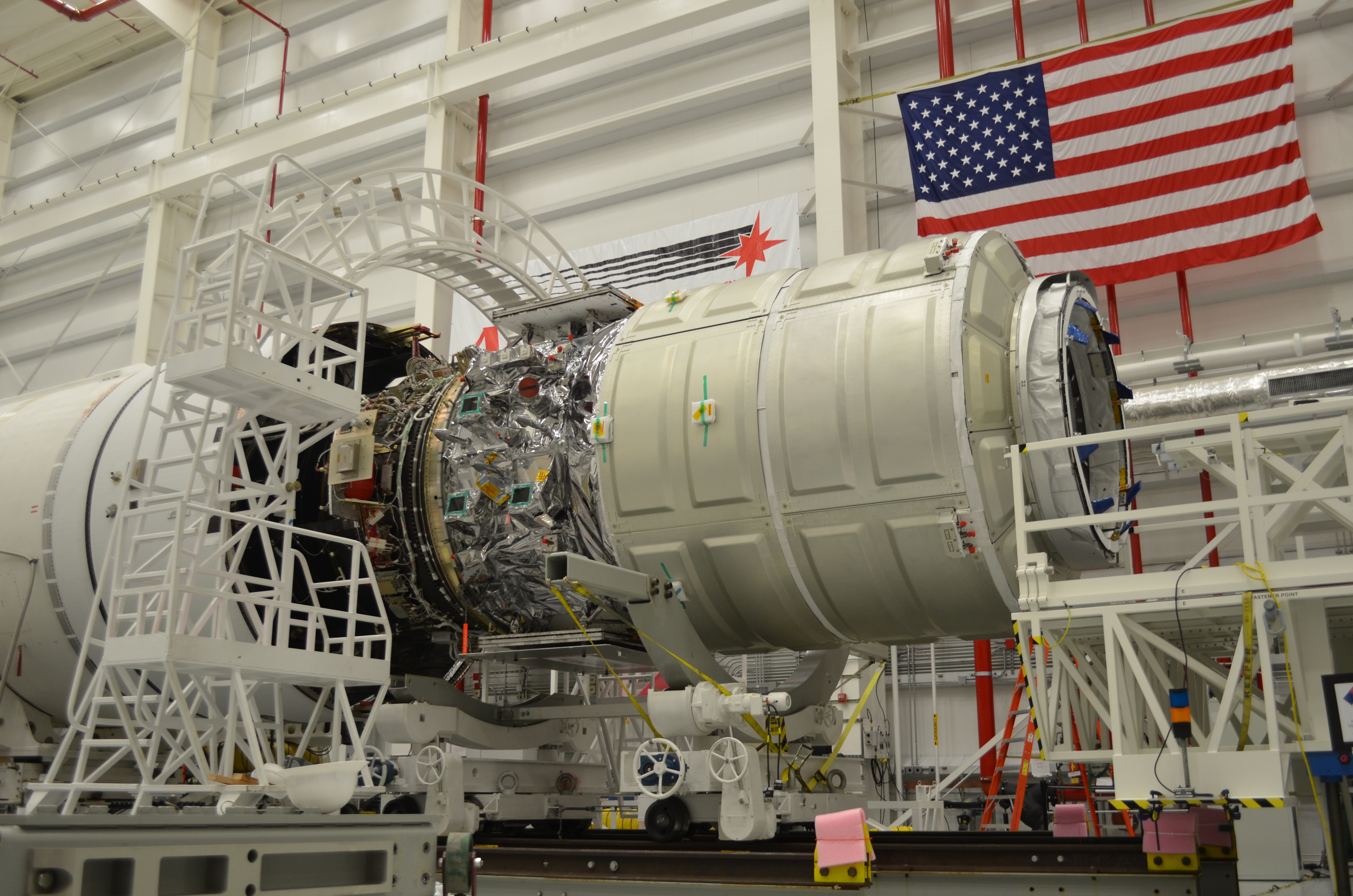
“We are very pleased with the early operations of the COTS demonstration mission, beginning with another on-the-mark launch by Antares. The Cygnus spacecraft appears to be fully healthy and operating as expected during this early phase of its mission,” said Mr. David W. Thompson, Orbital’s President and Chief Executive Officer. “Over the next few days, our Cygnus team, together with our NASA partners, will conduct an extensive series of in-orbit tests to verify the performance of the spacecraft before attempting the rendezvous and berthing operations with the space station. There is clearly still a lot of work in front of us, but the mission looks like it is off to a great start.”
Pending the successful completion of the COTS program, Orbital will begin regularly scheduled cargo delivery missions to the ISS under the $1.9 billion Commercial Resupply Services (CRS) contract with NASA. Under the CRS contract, Orbital will deliver approximately 20,000 kilograms of cargo to the ISS over eight missions through 2016. For these missions, NASA will manifest a variety of essential items based on ISS program needs, including food, clothing, crew supplies, spare parts and equipment, and scientific experiments.
